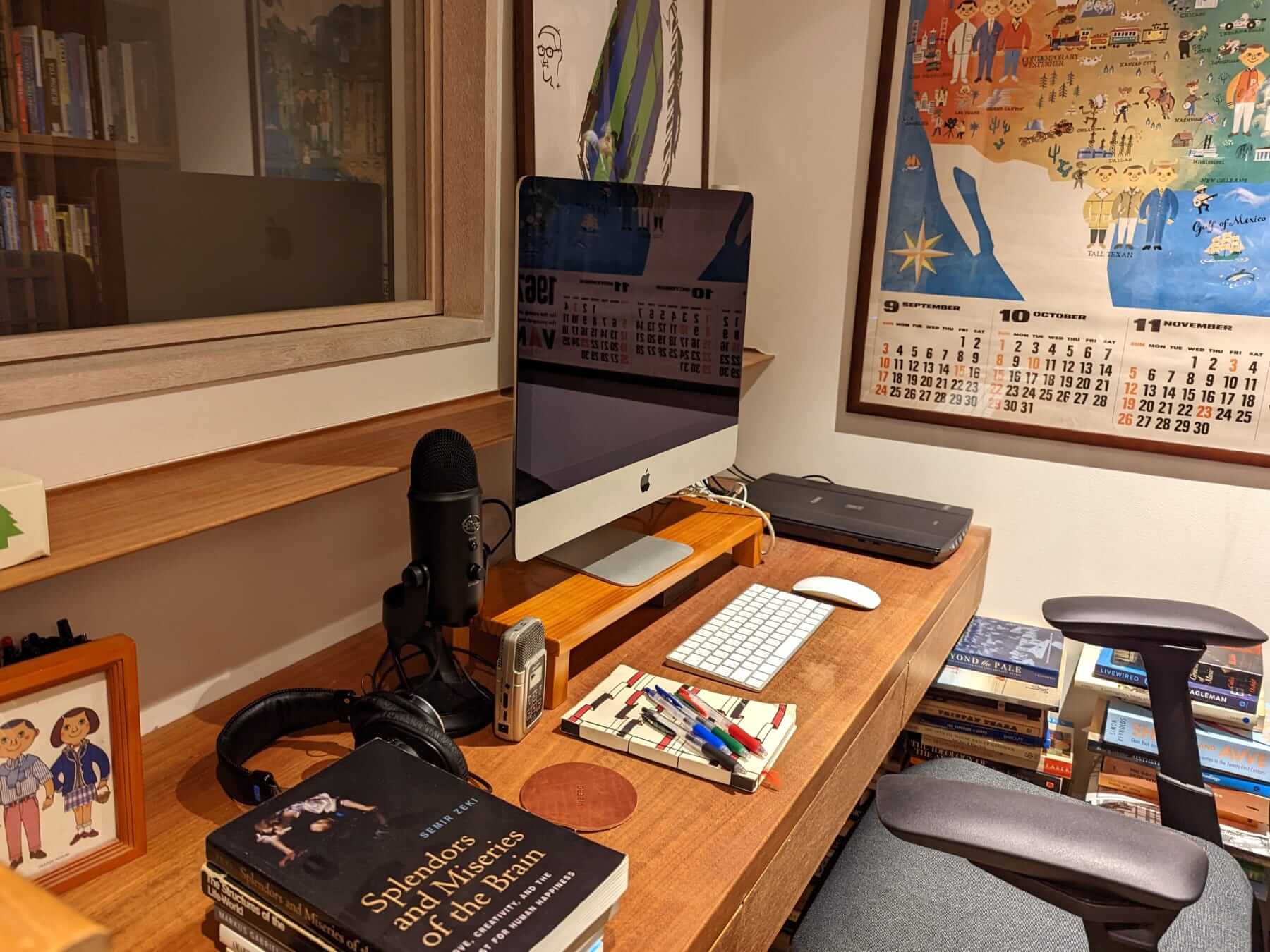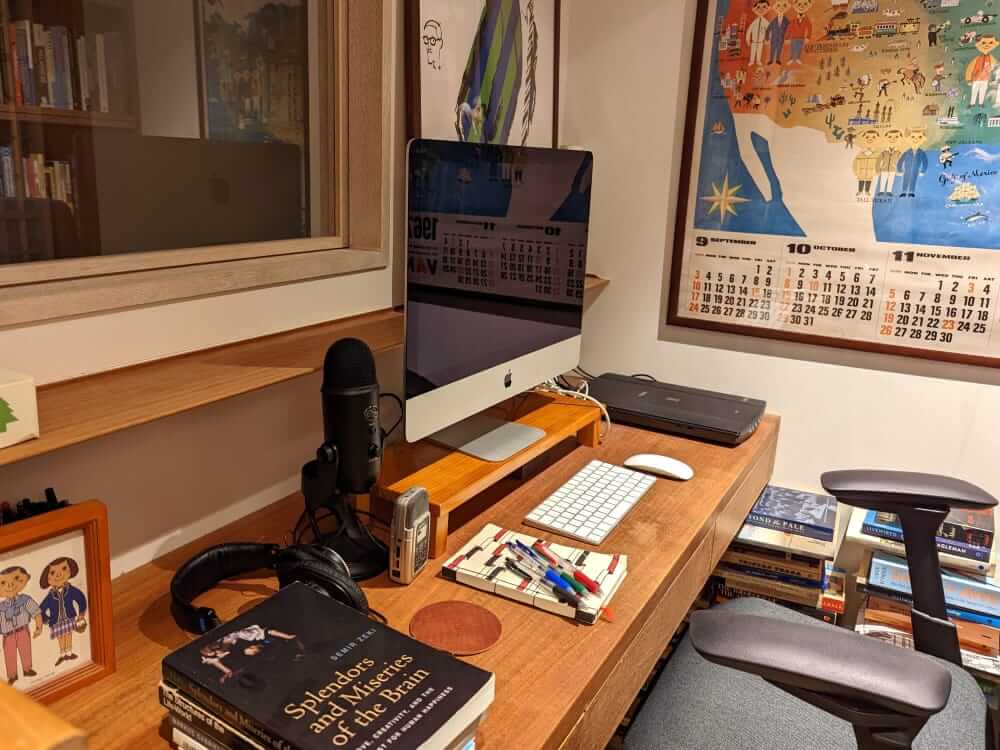From the Desk of ...
W. David Marx
Author

You likely know W. David Marx from his best-selling book, Ametora, a modern-day menswear bible about Japan's unique history with American style. He's also written for a handful of publications—from Monocle to Popeye. And his new book, Status and Culture (out September 6), dives into our human desire to acquire what's cool and chase clout. But for such a prolific and in-demand journalist and author, Marx says he was never much of a reader or all that great of a writer—even in college. But after visiting Tokyo in 1998, “I suddenly wanted to write about Japanese style and culture,” he says. “And that required me to make my prose a lot better.”
I tell Marx that I'd heard a rumor he wrote his senior thesis on Japanese streetwear and he happily admits that it's true. “While interning for a magazine in Tokyo, I discovered A Bathing Ape and ended up waiting three hours to buy a T-shirt,” he says. “When I told my teaching assistant about the entire ordeal, he said, 'That's your thesis,' which sounded insane to me at the time.” Back then, streetwear was extremely obscure, so Marx worried it might be too frivolous to be taken seriously. Not only was his thesis embraced by scholars, but it jumpstarted his career covering fashion and culture, from his unique position as an American in Japan.
Marx approaches his work with the precision and alacrity of a scientist in a lab. “My goal with the book was to define and organize the universal laws that guide culture,” he says. “And perhaps the biggest surprise was just how much everything made sense once you understand how status motivates individuals and how groups struggle against each other for status.” To understand cool, he says, we have to understand cachet, when objects (or behaviors) take on positive associations with high-status groups. Which leads in nicely to why we have this series. Valet. wants to know what guys like Marx have on their desk and how it relates to their career. We asked for a peek, to get a better idea on how he's working these days.
What’s currently
on my desk
- Sarasa 0.4mm pens, $4 by Zebra
- Plain notebook
- Document scanner, $259.99 by Cannon
- Framed postcards of illustrations by Kazuo Hozumi
- Simple wooden monitor stand
- Apple
iMac - Podcast microphone, $99.99 by Blue Yeti
- Handy recorder, $149.99 by Zoom
- Studio monitor headphones,
$164 by Sony - Leather coaster from Viberg Footwear
- Stacks of books

My desk is best when there’s nothing on it.
That helps me work. But I always have some pens, some paper and a scanner. Right now, I have my podcast mic and studio monitor headphones there too. Honestly, what is more interesting to me are the books behind my desk. I only put books I have read on these shelves—and then there are around 300 more on my floor. And, if I'm being honest, there's another 500 read and unread books in my basement. I find a lot of English used books in Japan for very cheap and have a hard time not buying them for potential future reading.

I love paper, of course, but I write digitally.
I've had terrible tendonitis since high school, so I can only write long-form using computers. Also, I'm not so much a writer as much as a relentless self-editor. I need to do about 20 drafts before I consider anything done, and this method requires word processing software.

Analog becomes really important in editing, however.
I always print things out on various paper sizes and colors, different font sizes, and different margins to see the text differently, and then mark up the printouts with various colored pens. I'm also obsessed with making sure my work follows a clear logic flow. For Status and Culture, I wrote every major concept in the book on note cards and then arranged them on my floor based on how I introduced them in order to make sure that the flow made sense.
I like to think through goals on a monthly basis.
I have a great calendar from Postalco that shows me the entire month. I also have multiple to-do lists: short-term ones on notepads and long-term checklists in apps.
I get a lot done in the morning.
I am unequivocally a morning person. I get up at 6 am and write from 7 am. I read while I commute, and if I have time later in the day, I'll type up notes or edit. The best part of writing every morning is that I can feel I've made progress no matter what else happens that day.
Advertisement
Listening to music keeps me on track.
It helps me focus, but it can't have lyrics. I've also realized recently I need music without much melody. Repetitive, noisy things are good. I basically wrote this whole book on Ornette Coleman, Steve Reich, Philip Glass, The Field and lots of krautrock.
I’ve dabbled with a few productivity apps.
The most important productivity tip for writing books is just to write every day. Since my books are based on research, I have developed a very mechanical system to get from ideas to text. As I read, I leave markings in the books for the quotations I want to capture. I then use Google Lens to OCR that text out of the book and paste it into my note-taking app. I then clean up those quotations and place them into a master outline doc, where every paragraph has its own bullet point. The outline is relatively flush with material long before I start writing, which means I never have to stare at a blank page. This system also makes it really easy for me to pick up where I left off even if I only have 15 minutes to write.
“Inbox zero”?
It’s absolutely not possible.
The way I see it ... every time you send an email, someone sends you one back.
There are clear cultural differences working in Japan.
The most stereotypical Japanese companies operate on a semi-military discipline that doesn't match my personality. During college, I interned at this very staid Japanese company, and one day when I unconsciously started whistling a bit while shuffling some papers around, my supervisor turned to me and said, “David, we don't whistle at this company.”
Whistling is not particularly important to me, but that was the moment I knew I should probably avoid working for a traditional Japanese company. Doing freelance projects for Japanese companies, however, is a different story. The intense professionalism makes everything very easy.
If I had to sum up the secret to my success, I’d have to credit books.
My particular style of nonfiction is rooted in intense research, which requires reading a large number of books. The important distinction here is books. The internet tricks you into thinking the world's information is a click away, but really learning about something requires a depth of knowledge that can only be sourced from books. Reading books cover-to-cover is also crucial, as you'll often discover key insights even in sections that may not have seemed relevant at first.
Follow What W. David Marx Is Doing
Advertisement




















